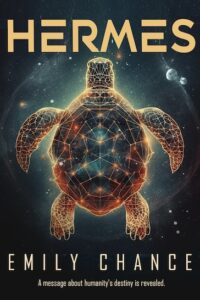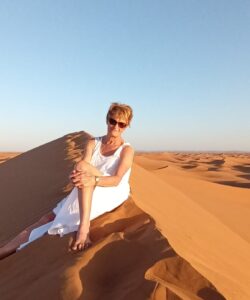
The brilliant-white wheel revolved majestically through the emptiness of space, a glorious contrast to the blackness it was passing through.
The station looked fully functional, its antennae spun around, searching out the heavens, and the docked vehicle appeared to be ready to journey into the deep, but the truth was quite different, this glorious testament to earlier achievements had been abandoned long ago. Onboard only one system was active, the scanner; and it was scanning the dead planet below.
The scan had been triggered by the intelligence that, in the absence of the crew, now controlled the station, a keen, resourceful, intelligence, that had been crafted with noble motives; to build a space vehicle that would take its creator to the stars. Its mission, now, entirely different, was to scan for signs of life below, but there was nothing.
The intelligence adjusted the station’s orbit over the planet. Paradoxically, the decision to initiate the manoeuvre was driven by an emotion, hope, not that there was much. The skies were toxic, electrical storms rent the sulphurous carbon dioxide-infested clouds.
As the station continued its journey, the intelligence updated the log, written in the beautiful script of the nation of storytellers who, one hundred years ago, had commissioned its construction. However, for any future reader, it would be the last fifty years entries that they would be rivetted by; the story of the planet’s unremitting decay, of the creeping destruction of all life, overseen by the dominant species of the planet. One way and another, everything had the life choked out of it, and no attempt had been made to stop it from happening.
However, there was to be one more act in this tragic drama, the scan’s beacon began to glow and resonate, four hundred and ten kilometres below, something was moving.
***
He crawled up the dune on all fours. He was covered from the searing heat of the sun in tattered and torn remnants of what had once been a state-of-the-art environmental suit. The real problem now, though, was breathing. The atmosphere was so thin it felt like he was inhaling dust. He stopped to thump his chest and coughed. Could he remember a time when breathing was easy, when you could inhale cool mountain air and gather energy from it?
Adam had moved up into the mountains of the South Island twenty years ago when the food riots had reached them. The riots had been going on across the rest of the world for many years, but his homeland, far off the beaten track, had managed to beat off any invaders and sustain itself. Eventually though, hundreds of thousands had arrived, overwhelming the local navy, and managed to make landfall. They were desperate, starving and war had quickly broken out. Well, not war – that sounds like something, coordinated, and organised. This was everyone for themselves and it was ugly. Anarchy had come within days, and he had retreated inland.
He knew he could hunt and fish in the lower Alps and sustain himself. But so did others and there had been confrontations, which had
led to death. He had survived in this manner for twenty years, isolated from the outside world without news of what was happening beyond the valley. Until now, when the forest fires had begun a few days ago. He knew if he was going to survive, he had to make it to the sea.
The journey to the coast had begun with a climb to the head of the valley to spy out the land to the coast. He had brought his infrared binoculars so he could check the city. Even now, after all these years, he was shocked.
Buildings were on fire, smoke rising into the sky. Some had collapsed, others were scarred, and external walls had disintegrated, exposing ransacked apartments, restaurants and offices. A story of ruin that global media had followed until it didn’t.
There was something else he noticed. An eerie silence; no traffic, no aircraft flying, no movement at all. The wind got up, which was when he sensed something even more defining: the stench of death.
It emerged out of bodies lying in the streets, and herds of cattle lying in the fields. A tale of unchecked rampant disease, of the thousand and one ailments of an unhealthy, disease-ridden population. He decided to go North and avoid the city.
He only needed to crawl a little further to reach the top of the Dune. On he went, clawing his way to the top. At last, he was there, he scrambled over the top and looked out.
It was over.
Far above, the intelligence considered the lone figure, looking out across the dried-up ocean seabed. He seemed to falter, then collapse in a heap and finally, he turned over and looked up to the sky. That was it, the last man standing… falling.
So, what should the intelligence do? It had been born out of a desire to facilitate but somehow it had at some point grown beyond that. It was now capable of having a point of view, which it could act upon, and most importantly a view shaped by the moral compass of its creator. For a long time, the intelligence considered what to do.
The creator had hoped to set out across the heavens to a world, teaming with life, that had been discovered one hundred years ago but had never found the means to do so. Therein lay the answer. They must reach out to the world that the creator had planned to visit.
On board the Barnamaj Station the calibrations were made, the data assembled, and a gentle stream of pulses passed out into the heavens. Their plea for help began its forty-light-year odyssey.
In response ‘they’ made no judgement; they simply sang of the wisdom of their world. From the bottom of the ocean depths to the water’s surface, all, from the smallest to the greatest, engaged in weaving a wisdom stream and as they sang, the strands wound together in a glorious singularity, which passed into the upper oceans and finally emerged into the twilight. The weave hung in the upper atmosphere, ready for its journey.
‘They’ constructed another song, a song of journey and the wisdom weave, propelled by the song, shot across the heavens, bending time. For it must not only go there, but it must go back. What wisdom did this three-billion-year-old civilisation send across the heavens, to give the dead planet a different future; was it technical, philosophical, even spiritual, no, it was none of those, it was the simplest of gifts, which was the foundation stone of their own glorious world’s achievements. The pathway to connection, to dialogue, to listening, sharing and acting with one singular glorious voice.
Earth – 10000 BC
The threads of catalytic understanding had arrived, the long journey was over. Streams of cool blue ribbons containing the wisdom of their world began to cascade down on to the pristine planet below. The creatures of the sea came up to the surface of the waters to greet the gift and embraced it and were sanctified, but how did early humanity respond? Driven by fear, they ran from the wonders that appeared to them and hid themselves away in dark places; the pathway, to their dark ending, remained unchanged. Something more, something more personal was needed.

By 2150, Earth is a toxic wasteland. The last exhausted, lonely, human has died. Far above the Earth, on an abandoned space station, an artificial intelligence originally designed to take humanity to the stars, sends a desperate plea for help to a world which they had been unable to reach.

EMILY CHANCE has been writing her highly regarded blog about her great passion, music, a theme which underscores Hermes, for almost two decades. The publication of this, her epic first novel, signals the beginning of her journey as an author, with a follow-up story, Angelia, already written. Emily is a very keen hiker. So, when she is not writing at her home in the Middle East, she can be found at various points in the year in the Alps of Switzerland, the mountains of New Zealand and the South Island of Japan, reminding herself of how precious and unique our homeworld is.

REVIEWS & LEGAL: